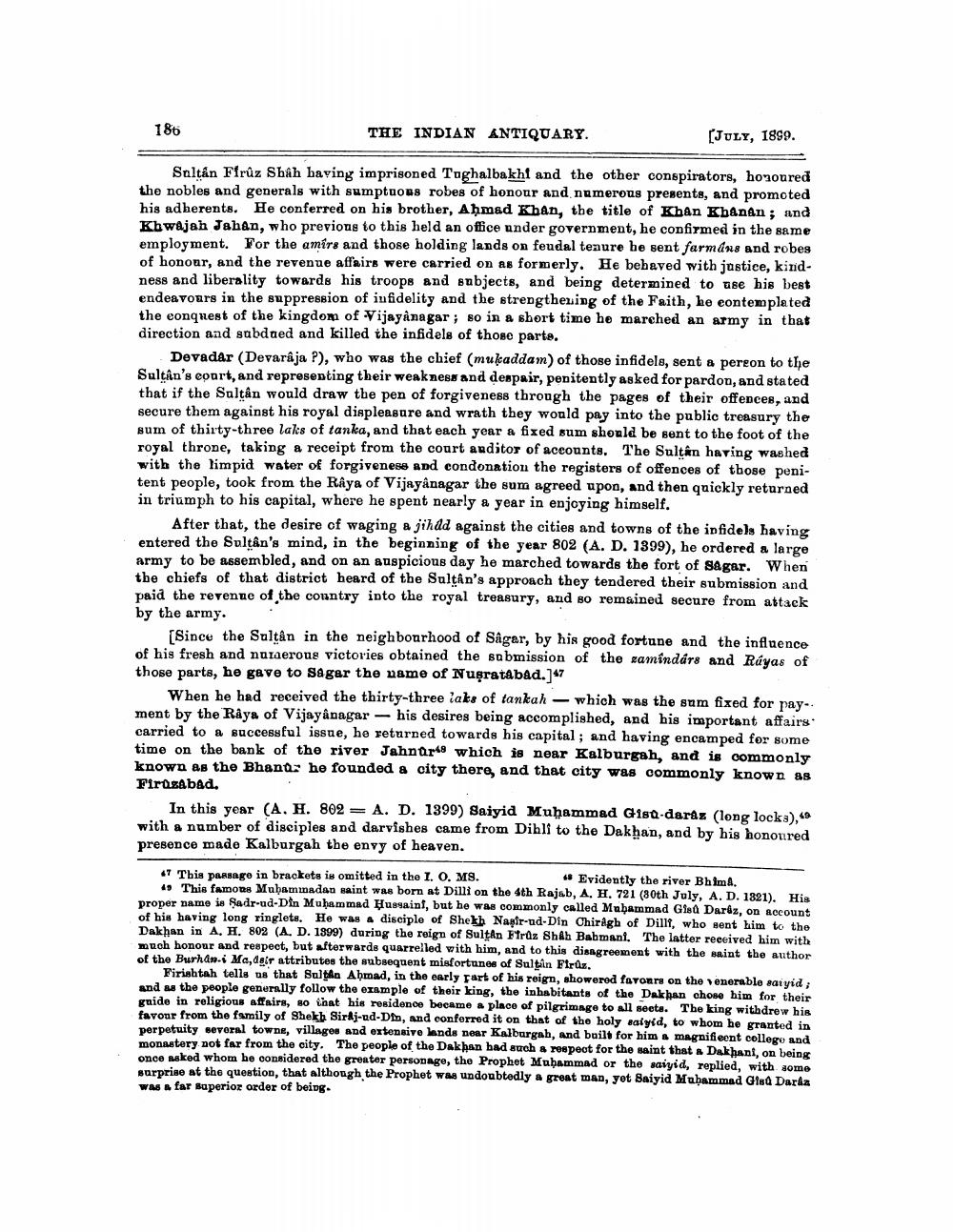________________
186
THE INDIAN ANTIQUARY.
[JULY, 1899.
Sultán Firûz Shâh having imprisoned Tughalbakhi and the other conspirators, honoured the nobles and generals with sumptuous robes of honour and numerous presents, and promoted his adherents. He conferred on his brother, Ahmad Khan, the title of Khan Khanan; and Khwajah Jahan, who previous to this held an office under government, he confirmed in the same employment. For the amirs and those holding lands on feudal tenure he sent farmáns and robes of honour, and the revenue affairs were carried on as formerly. He behaved with justice, kindness and liberality towards his troops and subjects, and being determined to use his best endeavours in the suppression of infidelity and the strengthening of the Faith, he contemplated the conquest of the kingdom of Vijayanagar; so in a short time he marched an army in that direction and subdued and killed the infidels of those parts.
Devadar (Devaraja ?), who was the chief (mukaddam) of those infidels, sent a person to the Sultan's court, and representing their weakness and despair, penitently asked for pardon, and stated that if the Sultan would draw the pen of forgiveness through the pages of their offences, and secure them against his royal displeasure and wrath they would pay into the public treasury the sum of thirty-three laks of tanka, and that each year a fixed sum should be sent to the foot of the royal throne, taking a receipt from the court auditor of accounts. The Sultan having washed with the limpid water of forgiveness and condonation the registers of offences of those penitent people, took from the Raya of Vijayanagar the sum agreed upon, and then quickly returned in triumph to his capital, where he spent nearly a year in enjoying himself.
After that, the desire of waging a jihad against the cities and towns of the infidels having entered the Sultan's mind, in the beginning of the year 802 (A. D. 1399), he ordered a large army to be assembled, and on an auspicious day he marched towards the fort of Sagar. When the chiefs of that district heard of the Sultan's approach they tendered their submission and paid the revenue of the country into the royal treasury, and so remained secure from attack by the army.
[Since the Sultan in the neighbourhood of Sâgar, by his good fortune and the influence of his fresh and nutaerous victories obtained the submission of the zamindars and Rayas of those parts, he gave to Sagar the name of Nugratabad.]47
When he had received the thirty-three laks of tankah - which was the sum fixed for payment by the Raya of Vijayanagar- his desires being accomplished, and his important affairs carried to a successful issue, he returned towards his capital; and having encamped for some time on the bank of the river Jahnûrs which is near Kalburgah, and is commonly known as the Bhant: he founded a city there, and that city was commonly known as Firuzabad.
In this year (A. H. 802 A. D. 1399) Saiyid Muhammad Gisa-daraz (long locks), with a number of disciples and darvishes came from Dihli to the Dakhan, and by his honoured presence made Kalburgah the envy of heaven.
49
47 This passage in brackets is omitted in the I. O. MS.
Evidently the river Bhima.
45 This famous Muhammadan saint was born at Dilli on the 4th Rajab, A. H. 721 (80th July, A. D. 1321). His proper name is Sadr-ud-Din Muhammad Hussain!, but he was commonly called Muhammad Gist Darêz, on account of his having long ringlets. He was a disciple of Shekh Nagir-ud-Din Chiragh of Dillf, who sent him to the Dakhan in A. H. 802 (A. D. 1399) during the reign of Sultan Firuz Shah Bahmani. The latter received him with much honour and respect, but afterwards quarrelled with him, and to this disagreement with the saint the author of the Burhan-i Ma, deir attributes the subsequent misfortunes of Sultan Firuz.
Firishtah tells us that Sultan Ahmad, in the early part of his reign, showered favours on the venerable saiyid; and as the people generally follow the example of their king, the inhabitants of the Dakhan chose him for their guide in religious affairs, so that his residence became a place of pilgrimage to all seets. The king withdrew his favour from the family of Shekh Siraj-ud-Din, and conferred it on that of the holy saiyid, to whom he granted in perpetuity several towns, villages and extensive lands near Kalburgah, and built for him a magnificent college and monastery not far from the city. The people of the Dakhan had such a respect for the saint that a Dakhani, on being once asked whom he considered the greater personage, the Prophet Muhammad or the saiyid, replied, with some surprise at the question, that although the Prophet was undoubtedly a great man, yet Saiyid Muhammad Glad Darda was a far superior order of being.




